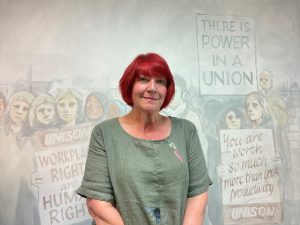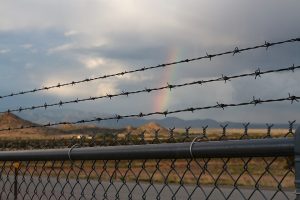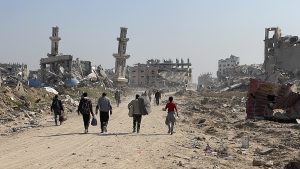‘Woman! Life! Freedom!’: the social revolution in Iran
Gh. H Saedi •As protests in Iran continue and deepen, Iranian activist Gh. H. Saedi looks at the potential of the struggle and argues for greater solidarity from the left in Britain.
After the murder of Zhina (Mahsa) Amini, a 22-year-old Kurdish woman, at the hands of the hijab police, and the nationwide mobilisations in protest, Iran has entered a new stage in the process of its social revolution. The beginnings of neighborhood committees, in collaboration with university students, trades unionists, and semi-structured network of feminist activists in big cities such as Tehran and Rasht, have managed to organise demonstrations in more than 100 cities across Iran. The mass has reclaimed its power over the streets.
In among the myriad events of the last week, some stand out as of particular political significance for the Iranian political sphere. Firstly, the nationwide spread of the slogan ‘Woman! Life! Freedom!’ which was first chanted at the funeral of Zhina in her home city of Saqez in Kurdistan. Although this slogan has clear connection with the workers’ slogan chanted in the 2019 protests (Bread! Work! Freedom!), we should not forget that it was originally created by women’s defense units in Syria and Free Women’s Union of East of Kurdistan (Kjar). So the chanting of this slogan in Kurdistan has a particular meaning, which points to the traditions of Kurdish socialist and autonomist projects in that region.
Secondly, the coming together of feminist activists in the big cities of Iran show us that semi-structured networks are useful in mobilising and leading mass protests and integrating the different demands of the urban poor, workers, the poor middle classes and other politically marginalised communities. However, these networks are unprotected in the face of the severe and violent oppression of the police, security and military units of the Islamic Republic. The arrest of many feminist activists in the previous days indicate that these networks need to be protected by more organized structures like trade unions and workers committees.
Statements from organisations such as the Coordination Council of Iranian Teachers’ Trade Associations(CCITTA), the Organising Council of Contract Workers in Oil Industry, the Haft Tapeh Sugarcane Syndicate, the Free Trade Union of Iranian Workers, as well as many unofficial statements from trade unionists in universities, show that some workers in Iran are preparing for a general strike in solidarity with the nationwide mass protests. Some universities have already begun striking with the immediate demand of releasing arrested students.
The events of 2 October show that the regime has decided to step up the use of violence in suppressing the mass protests and strikes. The regime’s forces created a bloodbath in Zahedan (southeast Iran) by killing dozens of Baluch people who were protesting in the streets. Repressive forces also besieged the Sharif university in Tehran and brutally wounded and arrested hundreds of students to terrorise other universities. The following day, students in many universities around the country responded by going on strike and calling demonstrations. This time, school students are joining the strike and calling for solidarity from their teachers. CCITTA has also called for a strike from 4 October which would add to the wave of strikes which began in late September.
Political divisions inside the Iranian diaspora
The tumult in Iran has inspired the Iranian diaspora across the world to demonstrate in solidarity with the struggle. In late September and again last weekend, major cities in Europe, north America and Australia saw tens of thousands of Iranians and supporters marching in memory of Zhina (Mahsa) Amini and against the Islamic Republic. For the most part, the aim of the organisers was to echo the significance of women’s struggle for their freedom and dignity, which is at the heart of Iran’s social revolution. However, one of the main problems the Iranian diaspora faces is the prevalence of male-dominated monarchist groups that attempt to take over the demonstrations, often violently. Their aim is to silence the voices of women and dominate the protests with monarchist flags and reactionary slogans that don’t represent the voices of women, workers, ethnic minorities, and other politically marginalised communities.
The 25 September protest in Manchester illustrated the critical situation that Iranian progressive activists are experiencing. This event was hosted by ‘Red Roots Collective’, a group of migrant feminist and socialist activists in collaboration with some British feminists, trade unionists and socialists – there’s a report of the event here. At the beginning of the event, monarchists started to disrupt the first speech (which you can read here) and silenced the speaker through heckling, as well as brutally beating one of the organisers of the event. However, thanks to support from British activists and Kurdish socialist organiations, the Red Roots Collective managed to relocate the demonstration to St Peter Square, and the other speakers were able to raise their voices in support of ‘Women! Life! Freedom!’.
The social revolution in Iran has to defend itself from two threats. Firstly, the Islamic Republic’s forces gained experience in Syria of suppressing revolution by creating bloodbaths in cities which were trying to become autonomous and emancipate themselves from Assad’s dictatorship. Secondly, the monarchists are trying hard to bring about a ‘controlled collapse’ of the regime and take over the revolution by mobilising right-wing nationalist forces inside Iran. Against both threats, feminists, socialists, trade unionists and other forces in this social revolution need the solidarity of the working classes in UK. This will require a major political shift in the attitudes of the British left toward incorporating internationalism into its everyday struggles.
The prospect of the failure of social revolution in Iran, due to a lack of international solidarity, would be, in William Blake’s words, ‘a misery to all of us’:
And many conversèd on these things as they labour’d at the furrow,
Saying: ‘It is better to prevent misery than to release from misery;
It is better to prevent error than to forgive the criminal.
Labour well the Minute Particulars: attend to the Little Ones;
And those who are in misery cannot remain so long,
If we do but our duty: labour well the teeming Earth.…
William Blake ‘The holiness of minute particulars’
View this post on Instagram














2 comments
The thing that I really noticed on Saturday at the Edinburgh Women, Life, Freedom protest was the inclusivity. None of the male domination noted in the article, and also very LGBT friendly.